ChatGPT, an AI-powered chatbot and language assistant from OpenAI, has set the record for the fastest-growing user base as of February 2023, according to Reuters, reaching 100 million users two months after its launch. Now candidates, recruiters and executives alike can do multiple tasks with the help of AI.
For recruiters, it may sound daunting, yet some say that relying entirely on ChatGPT for staffing is just around the corner (including recruiters and entire HR teams into the list of professions to be replaced by AI). And while it’s not happening yet, hiring specialists can now capitalize on AI for more efficient talent acquisition.
We are Alcor, a leading provider of IT recruitment services in Eastern Europe. Known for our “wow” service with 80% CV pass rate, we’re constantly looking for ways to do our job better, including testing ChatGPT for recruiting. Now we’re ready to share our findings, so keep reading and learn about effective prompt tips and use cases to speed up your hiring x3!
ChatGPT: a friend or foe?
Feeling dubious about whether it’s great or awful to use ChatGPT for hiring? After all, isn’t AI a looming threat? I’ve been there too and thus addressed most of the doubts below.
Will ChatGPT replace recruiters altogether?
No, the good news is that ChatGPT cannot compete with people in terms of soft skills and communication, so it won’t jeopardize your career. The bad news is that recruiters that use ChatGPT undoubtedly get a competitive edge over those who don’t. By applying ChatGPT in recruitment, they can facilitate candidate and resume screening, accelerate writing outreach e-mails, job ads and ideate interview questions faster — just to name a few perks. Of course, AI cannot persuade gainfully employed candidates to change their jobs, represent an employer brand, turn casual encounters into superior hires, or provide personalized feedback. For all that, empathy and soft skills are indispensable. So, you need not fear ChatGPT, but be aware of fellow recruiters leveraging it.
Will prompt engineering become a required skill for a recruiter?
Prompt engineering is the skill of writing prompts — text instructions for AI models — to make them generate a desired output. This profession is on top of trends in the sphere of artificial intelligence and machine learning. But you heard it right, it’s a whole profession, which requires a comprehensive understanding of how AI language and image generating work — that is to say, know the ins and outs of NLP, supervised, unsupervised and reinforced machine learning, deep learning etc. Therefore, if we take prompt engineering seriously, there’s no way a recruiter will know all this. And although this skill might be added to the role, it will only mean knowing how to write clear prompts, which can be learnt thanks to this article and some practice.
What stops recruiters from using ChatGPT?
ChatGPT is nothing other than a disruptive technology that makes professionals worry about being replaced. This concern may stop them from trying it out, as they prefer doing their job ‘the old way’. Or even if they try, chances are that first interactions with a language model don’t bring the desired outcomes, so it’s easy to give up even though the tool is said to be powerful. Also, recruiters can worry about losing that personal touch of interacting with candidates, thinking that their AI generated messages will become less emotional or individual. Such fear is justified because AI in recruitment isn’t a magic pill — it still requires human supervision.
How can ChatGPT automate recruitment?
There’s no doubt that using ChatGPT for talent acquisition can save you loads of time. How? You can speed up writing emails, outreach letters and job descriptions, as well as cut the time on assessing the candidate or extracting necessary information. To go further, you can also leverage AI for interview planning and market research. Why should you do it? The tech sphere is undergoing a major crisis related to the IT talent gap and the trend of Great Resignation. So, automating your recruitment will help you stand out and handle recruitment challenges with more ease.
8 Tips to Make Great ChatGPT Prompts
There’s great liberty in working with ChatGPT: you can write anything, including single words, comments, statements, questions, instructions or examples. The question is, how to collaborate effectively?
1. Assign a role to your AI agent
How do you start a conversation with ChatGPT? Well, you can greet it to kick it off. But essentially, the first step you need to take is create a role for your agent. It will help establish the context and make your request more specific from the very beginning.
These are the ways to assign a role to ChatGPT:
- You’re an IT recruiter. Write …
- As an IT recruiter, write …
- Assume the role of an IT recruiter and write …
2. Be crystal clear in your prompt
Your prompt shouldn’t be generic. If you say, ‘You’re an IT recruiter. Write a job description’, you’ll get lots of general words, vague requirements and no use from this interaction. To be clearer, add more details or examples and avoid overly complex prompts with meaningless words such as ‘just in case’, ‘if any’, ‘if possible’, etc.
3. Mention the style, target audience and objective
Elaborating on clear prompts, I recommend giving the main details right from the start. If you’re writing a job description, it can be catchy, engaging, vivid and so on. Our target audience are developers with particular skills which we should also mention. The objective of a job ad? To get the applicant interested in working for a particular company.
4. Include keywords
Imagine you’re working with search engine optimization. What will be your main keywords for a job ad, for instance? I’d say, location, employee skills or experience and some details about the employer, as they certainly should be included to write a concise description.
Let’s look at what we get after combining the aforementioned tips:
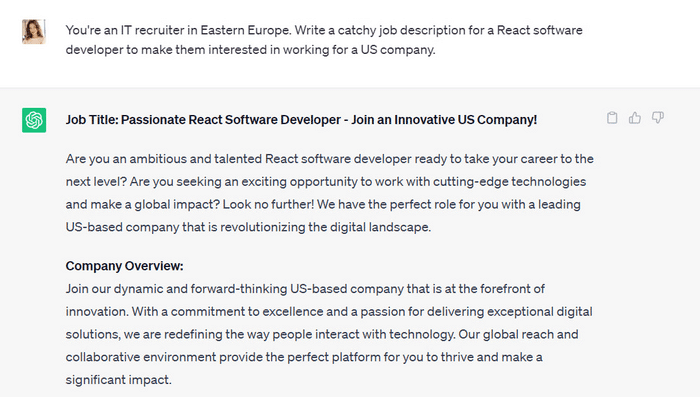
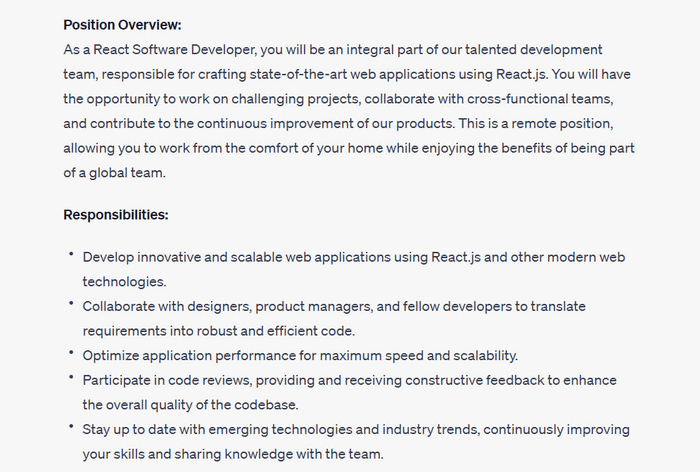
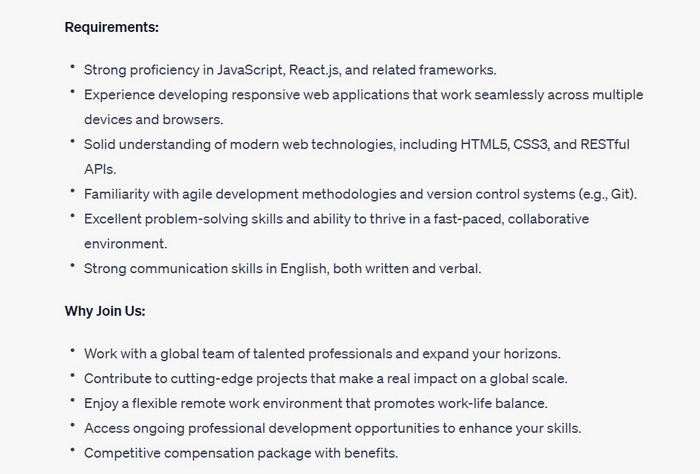

Sounds quite catchy, doesn’t it?
5. Break down your requests
Looking at the results above, I can say that there’s something missing. To be more specific: details about the company. You can include them in the very first prompt or, if you have a lot of information for ChatGPT to process, I recommend dividing your request into several blocks, thus creating follow-up or refinement prompts where you add in the information and improve the result. This way, you’ll be able to manage the process a bit more and ask ChatGPT to iterate down the road if necessary.
So, keeping the conversation going, I’m gonna add more information and ask for some changes:

6. Spur creativity with conditions
Another thing I’m not satisfied with in the first result is that the description is rather lengthy. That’s why I’ll ask my agent to limit the word count of the description. Conditions and limitations generally lead to more creative outputs, so using such phrases as ‘no more than…’, ‘no longer than…’ will make your prompts clearer. Let’s see how that works?
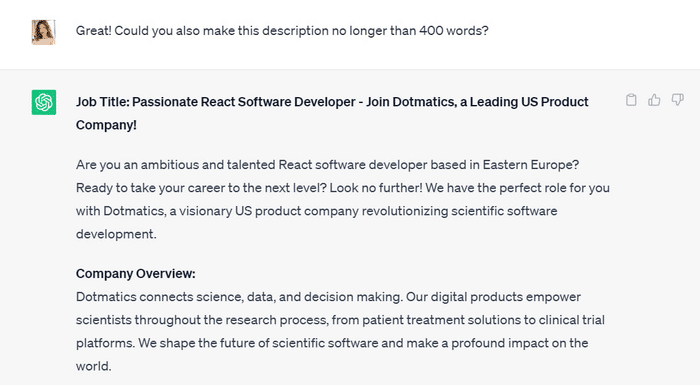
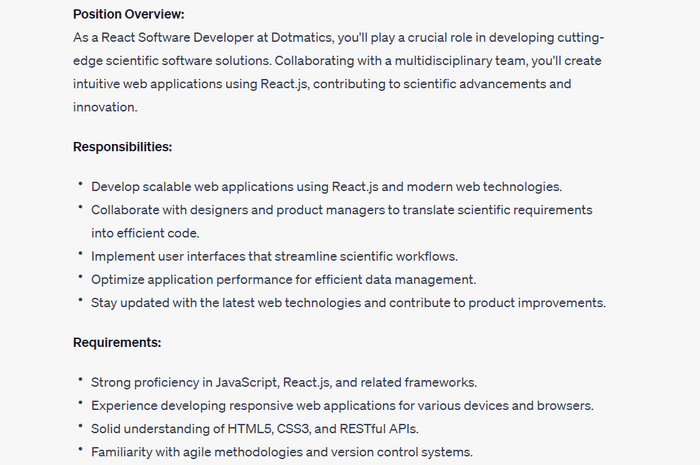
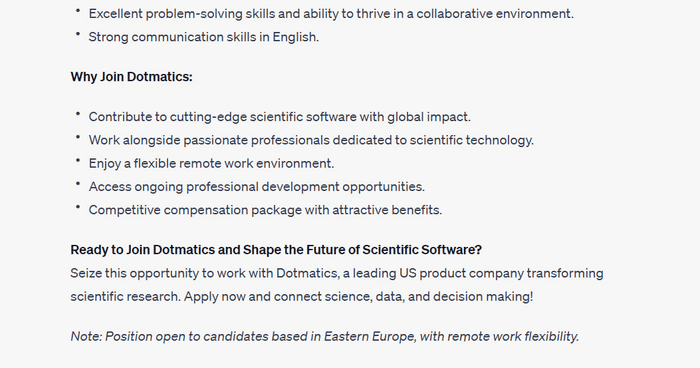
Now, that’s much better!
7. Iterate, iterate, iterate
Of course, there’s room for improvement even with the best of prompts, but at least now you’ve got the gist. It’s up to you to keep tweaking your requests for better results. We’re testing it all now with our recruiting team and still looking for the most effective usages. After all, when working with Dotmatics, we managed to fill most positions with the first candidate, and it’s quite challenging to find a match for that using ChatGPT for IT recruitment. Nevertheless, we’re not giving up and looking for ways to capitalize on this tool for automating some tasks.
8. Keep ChatGPT limitations in mind
Finally, ChatGPT is not almighty, so here are a few things to remember:
-
It is inherently biased. Your output practically hinges on your input. So, if you ask a leading question, such as ‘Why IT outsourcing to Eastern Europe is less effective than setting up your own team there?’, you’ll get a lop-sided response that will only highlight the positive aspects of the second option rather than provide a factual comparison.
-
It can write nonsense. This is called AI hallucinations, i.e. entirely plausible but factually inaccurate answers. Double checking is worth it with AI.
-
Its access to information is restricted. Have you heard about the trend to help ChatGPT ‘break out’ in the Internet? Yes, you got the point, it doesn’t have direct access to it. Its training dataset is limited, and the model will even tell you so:

Summing up, I’m encouraging you to benefit from our prompt tips and use AI for recruitment, but do so wisely.
3 ChatGPT Use Cases in Recruitment
Now, getting down to business and more practical ChatGPT use cases!
Case 1: writing candidate-oriented texts
Writing makes up the bulk of recruiting use cases. You’ve already seen how to write job descriptions, but there’s so much more you can delegate to ChatGPT for reaching your talent. For instance, you can write candidate outreach e-mails or make e-mail templates and create candidate summaries for internal recruitment or to share with management.
Here’s one of ChatGPT examples for writing e-mails:
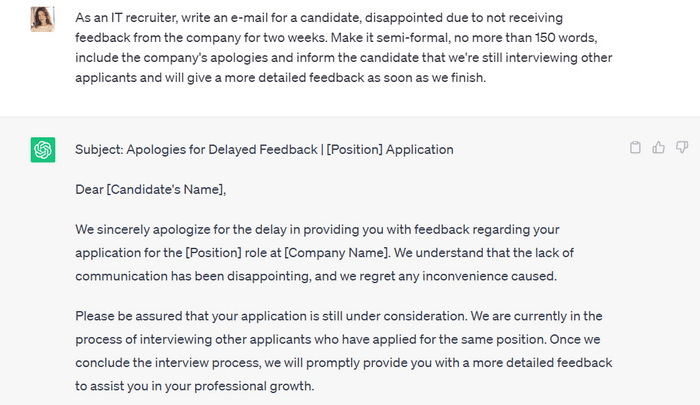

Case 2: simplifying information search and extraction
Another way to use ChatGPT for recruitment is to search for and extract necessary data. With regard to that, you can perform the following tasks: create Boolean search strings to research the markets, draw a list of keywords for a job description or break down a complex job ad, as well as extract keywords or interview questions from one.
To give you an example, I asked ChatGPT to extract at least 10 technical interview questions from the job description we’d created earlier to perform pre-screening, and here’s the response:
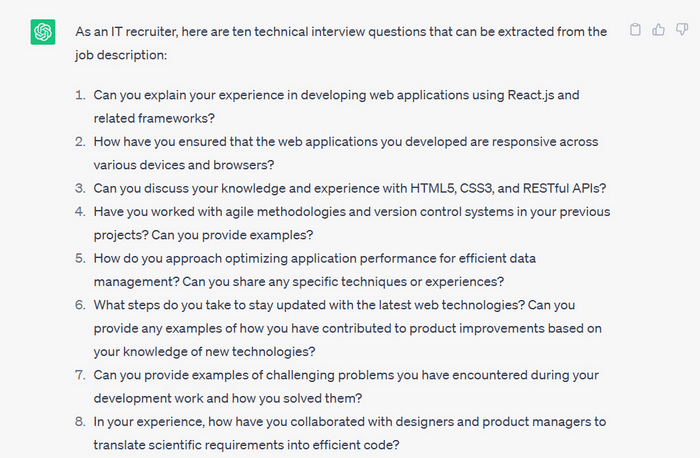

Case 3: assessing and ideating
Assessing candidates’ skills against job specifications or ideating an interview questions bank by role or interview type is also possible when using AI for recruiting. My personal favorite ideation shortcut is to brainstorm employer value propositions and mission & values statements. It’s a crucial part of any recruitment strategy so I wouldn’t delegate it fully, but I’d certainly see what directions technology can offer.
For instance, once we managed to hire 32 specialists for the company Sift thanks to a powerful employer branding campaign. To achieve this result, Alcor engaged 10 IT researches along with 3 recruiters and an account manager for managing & tracking the progress. Simultaneously, we shot an informative video with the Hiring Manager from Sift to introduce the company on the Eastern European market. As a result, we impressed Sift with our great hires: even without using AI for staffing, we managed to hire a Head of R&D and close other important positions, some of them — a Ruby on Rails developer — in just a week, which is why Sift has entrusted us with more.
Let’s see what ideas our AI-helper would suggest:
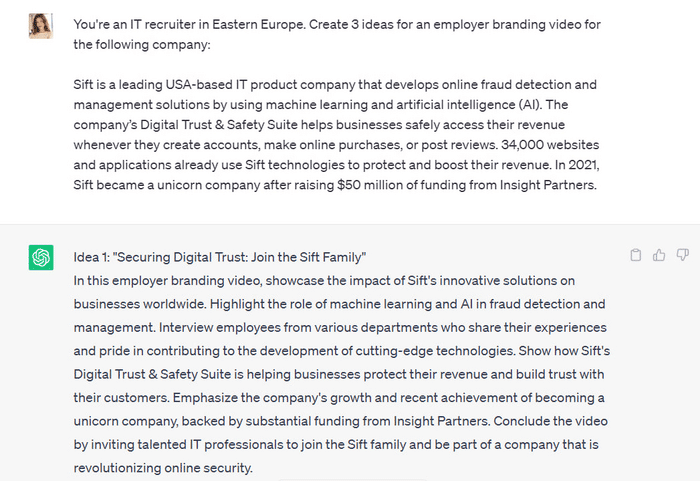
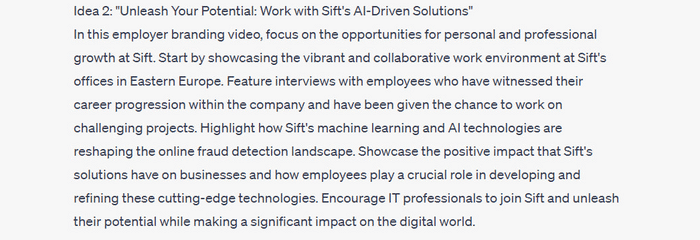
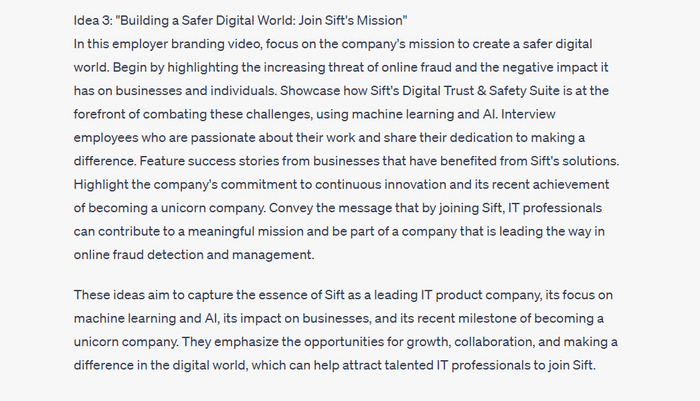
So, now you’re equipped for setting out on your recruitment journey with ChatGPT. Last but not least, don’t forget to check the information for bias or factual mistakes, fine tune your prompts and review all messages before sending them to the candidate. AI speed together with human creativity & attention can work wonders together, I’m sure of it!
We are Alcor — a Trusted IT Recruitment Partner. Nice to meet you!
Alcor can be your IT recruitment provider in Eastern Europe — namely in Poland, Romania and Bulgaria. We assemble a full-fledged software development team in 3-6 weeks with the help of recruitment process outsourcing (RPO), as well as promote your company on the market and tackle legal and tax issues — all of that for reasonable IT recruitment agency fees.
Having operated in the Eastern European talent pool for 10 years now, we can guarantee you highly qualified software engineers with exceptional tech stacks and an impressive level of English. 98% of our candidates pass the probation period in their companies — impressive, yes? So, feel free to reach out to us if you need recruitment assistance!
FAQ
1. Will ChatGPT replace recruiters in the near future?
No, you can take a breath. ChatGPT is not there yet — it lacks inherent human empathy and communication skills. However, other recruiters leveraging cutting-edge technology are posing quite a threat!
2. Can ChatGPT become a competitive advantage for a recruiter?
Absolutely yes. You can become much more efficient by automating most recruiting processes with it. That will help you fill more positions in less time. A win-win!
3. What IT recruitment processes could be optimized using ChatGPT?
With this language model, you can ideate for employer branding and interview questions, extract information, accelerate your research, craft email templates, assess candidates and their CVs, plus write job descriptions.
❤️ 4. How to use ChatGPT effectively?
Learn the subtle art of prompts. To be good at it, you need to be specific, give the necessary context, keep AI limitations in mind and experiment!. In this article you’ll find more examples of that.
